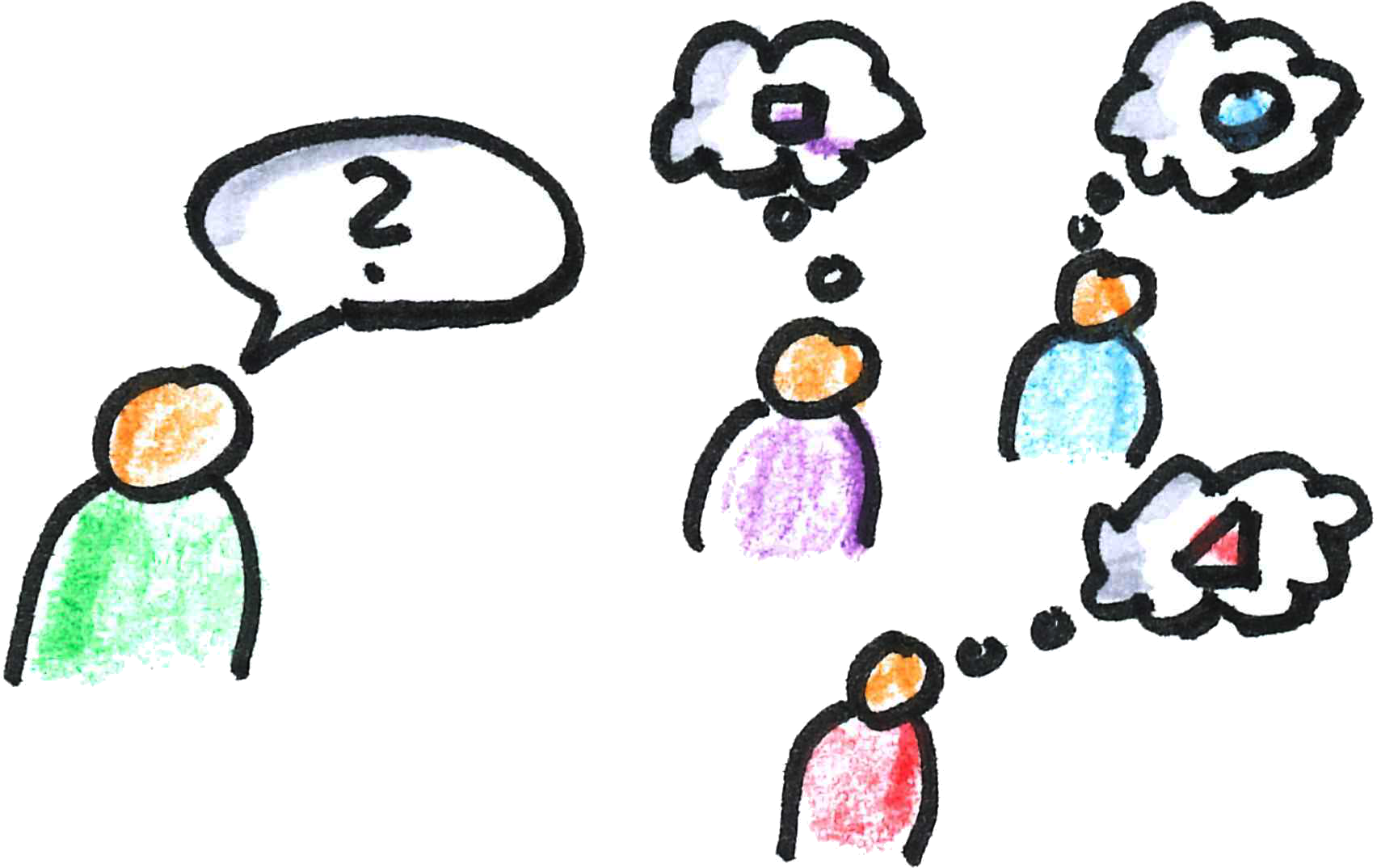My work supervisor (and Jewish feminist role model) asks me to consider who in my life inspires me to ask good questions; because my job as “Director of Communications and PR,” she explains, is to generate good questions, to listen closely and earnestly to the responses, and follow them, without unnecessary attachment to pursuing answers.
As she gets worked up with energy from expounding on her ideas, she sketches a drawing of planets in the galaxy, and writes my name in the middle; she adds arrows between my “planet” and the other cosmic bodies, and the arrows are marked with Q’s and A’s. I am a bridge between worlds. I am a translator, a transmitter, a transformer – through the relational power of questions.
My answers range from Ira Glass to my peer listening hotline training, from my Hebrew school students to my therapist, from my Talmud studies to my sociology thesis advisor. Some patterns emerge when I compare and consider these various sources of inquisitive guidance; most broadly, most of these teachers begin by pointing out an issue, however random, however big or small, and calling attention to it, thus introducing a challenge. Notice X…notice Y…If X, then how can Y…?
Embodied in Talmudic disputes, this approach draws out an issue rather than rushing to conclusions, demanding initial observation of the itch in the question itself before even introducing the possibility of scratching it. It’s like the catchphrase we learned in elementary and middle school, when we learned to navigate the classic Torah commentator: “What’s bothering Rashi?” The point – like when I voraciously consume Jeopardy! and keep score on paper, screaming out my responses – is to identify the question.
The debaters of the Talmud do not accept statements at face value. And so, I too practice seeking out the uneven stitches. Feeling around for rough edges, once I notice the inconsistencies, I cannot unsee them. This is especially inconvenient when the inquiry process draws attention to unflattering realizations about myself. Good questions have the power to gently reorient the questioner and draw them to notice their own positions. Good questions can force us to be more honest, and maybe even allow us to become more free.
“One Must See Herself”: A Meditation on Four Children’s Questions
In terms of four voices her mind spoke: Wisdom, Darkness, Simplicity, and Speechlessness.
The Wise Mind asks:
What should I do next?
Listen to your heartbeat, you must tell her, before anything else.
But what is the right move? She insists.
The one you make, sweetheart.
What do you notice?
My breath, again and again.
The Dark Mind asks: “What’s wrong with them? What’s wrong with you?!”
Everyone is getting everything wrong today. The bourekas guy gave her cheese instead of mushroom, and then he took two whole minutes to make proper change. And that frum teenage girl just cut her in line for the bus, and the driver laughed at her accent and the Rav Kav machine took way longer than it should have.
Fuming, she arrives at her seat, where, naturally, the USB-port above is obsolete, while her phone struggles to push through on 12% battery. It feels like too obvious of a metaphor; she is done with today.
She bumps her head against the window, rubs the affected area, and scoffs in frustration. In her throat is that cold lump she knows as a prelude to crying, and these are angry tears, and she is resigned to fighting back.
She asks again, with what oxygen she can muster: What is wrong with them? What is wrong with you?! Why can’t you just get it right for once?
And you must respond:
Nothing is wrong with you, precious.
You must turn the question around, infusing her words with patient curiosity:
What is wrong, sweetheart? What hurts you so?
The only real answer is compassion.
“Why are you in such a rush?” asks the Simple Mind
And you answer: to get to the bank sooner, to take a number faster, to sign my name ten different times, and leave with a plastic card, then get back home and watch videos of paint mixing, and talk about how I should be doing any number of more productive things.
Simple wonders aloud in response – to you, but also to nobody in particular – You have time. And look – toddlers on scooters! Would you rather live your life smiling or not?
You must smile and put your phone away, smell flowers and sip your coffee more slowly. You trust that you have enough time, whether or not that is empirically true. You spend money on bottles of water with aloe vera cubes and fruity flavoring because it just feels good.
You must listen to her, because it can be – you can be – simpler.
The Speechless Mind is paralyzed – not even by fear, but by the anticipation of it. She fears questions because she fears the unknown within her, in the space between the questions and something resembling answers.
You must reorient her, turn her around to see herself, to look long enough to stop fearing what she may find. You must teach her to return to herself. You must ask her: What do you feel – in your toes, in your soul?”
And all the voices – Wise, Dark, Simple, and Speechless – call out to you: How can you be even more free?





